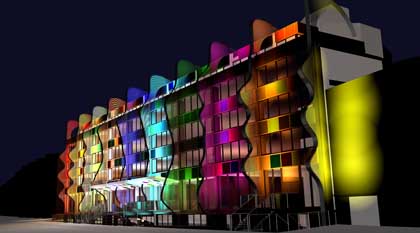
The largest artist-led arts organisation in the South-East of England aims to get bigger, or at least better.
Phoenix Brighton, which currently provides studio space and a gallery for 100 artists, last week announced plans to revamp their city centre building at a projected cost of more than £2 million.
Development Manager David Litchfield hopes that a new entrance way, façade and lift will all help open up the building to wider audiences. A refurbished gallery, new café, shop, and workshops are also planned inside.
While the “core purpose” of Phoenix remains the provision of affordable studio space, Litchfield is pragmatic when it comes to finances, admitting the building needs to generate new income to ensure its long-term survival.
A recent programme of public events, including annual jumble sale Art Junky, one-night festival White Night and experimental evening Factory have allowed the energetic director and his team to road test their vision of developing a visual arts hub in Brighton.
He claims 90,000 cars pass Phoenix on their way into the city every day. “The building has a real opportunity not just to announce the fact that it’s a creative centre for the arts, but also to welcome people to Brighton, to be symbolic of the arts activity here,” he adds.
A slightly larger gallery with better specifications should attract high profile exhibitions with a focus on working process, reflecting the organisation’s main raison d’être.
“We want it to be a place where artists can come and explore and experiment,” says Litchfield.
“We want that to then extend out to the public so that they can come and engage with that working process to get insights into how artists think and work.”
The shop will be a place where artists can sell their work, with the adjacent café/bar a place where they can meet. Late openings are planned at weekends alongside an events programme including curated talks, visiting artists, performances, music, installations and a curated film programme.
Development will be tailored to the needs of the building’s studio users. “It’s very easy to take an architect’s drawing and get the builders to build you a café/bar,” says Litchfield.
“You could get something that looks like it’s come out of an airport or a hotel, and that’s kind of not evocative of the Phoenix spirit,” says Litchfield.
Instead he has involved the artists in choosing colours and materials and designs. This, he says, will not only provide both a feeling of “ownership” and a “sense of continuity about Phoenix and what it is.”
But because the organisation has a 17-year history of independence to maintain, they face a challenge in terms of financing most of the planned work themselves.
A sizeable chunk of funds could, pending the approval of Brighton and Hove City Council, come from an advertising hoarding on the building façade, raising £500,000 during the four-year course of the project.
More revenue could come from the ground floor redevelopment, in which the café, shop and workshops, together with a commercial letting space, could generate £50,000 a year over and above the rent from fully-booked studios.
For the rest of the funding, artist-led Phoenix will be looking for business partners. But the temptation to cash in on their real estate – the organisation bought the building with help from a Council grant in 1993 – would be “completely wrong”, argues Litchfield.
The motives behind starting Phoenix have informed every stage of the redevelopment. “It is a provider of affordable studio spaces, out of which flows a gallery, out of which flows a desire to engage with our audiences,” he reflects.
The building’s all-important residents range from painters and sculptors to filmmakers, wood and metal workers, curators and performance artists. They’re “generally extremely supportive”, according to Litchfield.
“It’s exactly where they want to see Phoenix going,” he says. “I suppose because of that, we actually might be able to make this happen.”
Written for Culture24.
No Comments